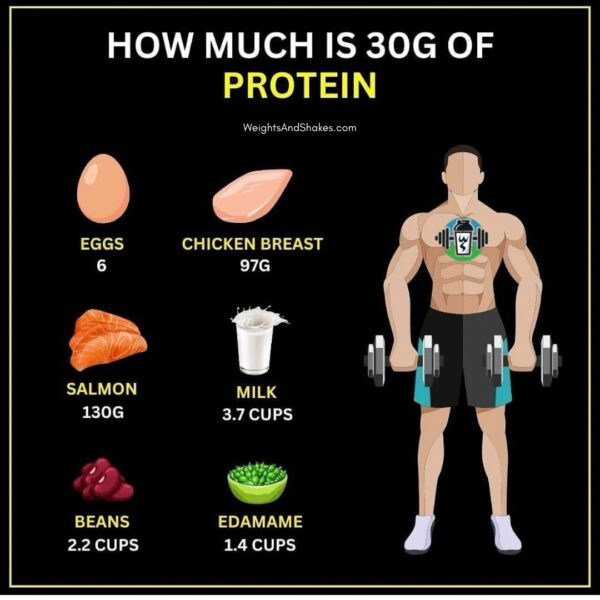Sign Up for Newsletter
When it comes to building muscle, staying fit, or just maintaining a healthy lifestyle, protein is king. It’s the building block of every cell in your body, crucial for everything from muscle repair to immune function. With the growing popularity of protein shakes and supplements, it’s easy to forget that some of the best protein sources come from real, natural foods. While a well-formulated shake can be an excellent supplement to your diet, relying solely on them can cause you to miss out on a host of nutrients and benefits that whole foods provide. Let’s dive into why and how you should prioritize natural sources of protein—eggs, chicken breast, salmon, milk, beans, and edamame—in your diet.
Eggs: The Perfect Protein Package
 Eggs are often touted as nature’s multivitamin, and for good reason. Each egg is packed with about 6 grams of high-quality protein, complete with all nine essential amino acids that your body can’t produce on its own. But that’s not all—eggs also contain vitamins A, D, E, and B12, as well as important minerals like iron, selenium, and choline, which support brain health.
Eggs are often touted as nature’s multivitamin, and for good reason. Each egg is packed with about 6 grams of high-quality protein, complete with all nine essential amino acids that your body can’t produce on its own. But that’s not all—eggs also contain vitamins A, D, E, and B12, as well as important minerals like iron, selenium, and choline, which support brain health.
The beauty of eggs lies in their versatility. Scrambled, boiled, or even poached, they can be incorporated into nearly any meal, providing a quick, affordable, and nutrient-dense source of protein. Moreover, recent research shows that dietary cholesterol in eggs has little impact on blood cholesterol levels for most people, so you can enjoy them without guilt.
Chicken Breast: Lean, Mean Protein Machine
When people think of high-protein foods, chicken breast is often at the top of the list. It’s no wonder why: a 3-ounce serving of skinless chicken breast contains a whopping 26 grams of protein, with very little fat. This lean meat is not only low in calories but also rich in B vitamins, which are essential for energy metabolism and maintaining healthy brain function.
Chicken breast is also incredibly adaptable. Whether grilled, baked, or stir-fried, it pairs well with a variety of seasonings and sides, making it a staple in meal prep for those looking to build or maintain muscle. Plus, its high protein content can help keep you full longer, reducing the likelihood of overeating and helping with weight management.
Salmon: Protein and Omega-3 in One Delicious Package
Salmon is a true nutritional powerhouse. Not only does it provide about 22 grams of protein per 3-ounce serving, but it’s also loaded with heart-healthy omega-3 fatty acids. These fatty acids are known for their anti-inflammatory properties and play a key role in brain health, reducing the risk of cognitive decline as we age.
In addition to omega-3s, salmon is rich in vitamin D, which is crucial for bone health, and selenium, an antioxidant that helps protect against cell damage. Whether you prefer it grilled, smoked, or baked, incorporating salmon into your diet at least twice a week can significantly boost your overall nutrient intake.
Milk: The Original Recovery Drink
Long before protein shakes became popular, athletes were chugging milk after workouts—and for good reason. A single cup of milk provides 8 grams of protein, along with a balanced mix of carbohydrates and fats, making it an ideal recovery drink. Milk is also a great source of calcium and vitamin D, which are important for bone health, especially as we age.
For those who are lactose intolerant, lactose-free options are available that provide the same nutritional benefits. And if you’re concerned about fat intake, skim or low-fat milk offers all the protein with less fat, making it a versatile option for any dietary need.
Beans: The Plant-Based Protein Powerhouse
Beans are a fantastic source of plant-based protein, boasting about 15 grams of protein per cooked cup, depending on the variety. They’re also rich in fiber, which aids in digestion and helps keep you feeling full longer. Beyond protein, beans offer a wealth of micronutrients, including iron, magnesium, and potassium, which are crucial for muscle function and cardiovascular health.
One of the biggest advantages of beans is their versatility. From black beans to lentils to chickpeas, there’s a bean for every palate. They can be added to salads, soups, stews, or even made into a delicious dip like hummus. This makes beans a valuable addition to any diet, especially for those who are vegetarian or looking to reduce their meat consumption.
Edamame: The Snack with Benefits
Edamame, or young soybeans, are not only a delicious snack but also a rich source of complete protein, containing all the essential amino acids. One cup of edamame provides about 18 grams of protein, along with fiber, iron, and magnesium. This makes it an excellent option for vegetarians and vegans, or anyone looking for a nutritious, plant-based protein source.
Edamame is incredibly easy to prepare—simply steam it and sprinkle with a bit of sea salt for a satisfying snack. It can also be added to salads, stir-fries, or blended into dips for an extra protein boost.
Why Shakes Still Have a Place in Your Diet
While whole foods should be your primary source of protein, there’s no denying the convenience and benefits of a quality protein shake. For those with busy lifestyles, shakes can fill nutritional gaps when whole foods aren’t available. They’re also a great option post-workout when your body needs a quick protein boost to kickstart muscle recovery.
However, it’s important to view protein shakes as a supplement, not a replacement for natural food sources. Whole foods provide a range of other nutrients—like fiber, vitamins, and minerals—that are often missing in shakes. By focusing on natural sources and using shakes strategically, you can ensure you’re getting the complete nutrition your body needs.
Weights & Shakes: Helping You Fuel Your Journey
At Weights & Shakes, we believe in a balanced approach to nutrition that prioritizes whole foods while making smart use of supplements. Our lifestyle coaching services can help you create a personalized plan that fits your goals, whether you’re looking to build muscle, lose weight, or simply improve your overall health. Contact us today to get started on a plan that’s right for you!
Related Articles
Health & Wellness, Uncategorized




